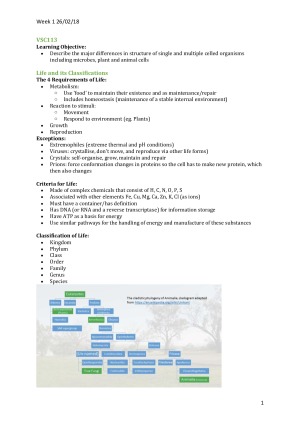VSC113 Notes
Subject notes for CSU VSC113
Description
Notes for the entire semester of VSC113. Topics include: -Major classes of biological molecules important for cell function -Structure, function and classification of micro-organisms such as viruses, bacteria, protozoa and fungi. -Structure and function of nucleated cells and major differences between plant and animal cells. -Control of the cell cycle. -Biological membranes, cellular signalling and transmembrane transport processes. -Flow of genetic information, control of gene expression, gene families and cancer. -Recombinant DNA technology and its application to animal and veterinary sciences. -Culturing micro-organisms and control of microbial growth. -Structure and classes of multi-celled organisms, invertebrates, helminths Learning objectives include: -be able to describe the families of biological molecules essential for life (proteins, carbohydrates, lipids and nucleic acids) and outline their anabolism and catabolism; -be able to describe the basic structure of cells, including various subcellular structures in relation to their function; -be able to detail the structure and functions of cellular membranes, their integral proteins and describe the role these play in cellular communication; -be able to describe chemical transport of ions and molecules across biological membranes; -be able to demonstrate the basic understanding of muscle structure and function; -be able to describe the flow of information from DNA to proteins, and its control; -be able to discuss the importance of the cell cycle and its control in normal and neoplastic cells; -be able to describe the inheritance of genes and their basic structure; -be able to define mendelian inheritance patterns; -be able to solve monohybrid and dihybrid problems; -be able to demonstrate a basic understanding of the structure, function and pathogenicity of various classes of micro-organisms -be able to culture and identify various classes of micro-organisms; -be able to describe the major differences in structure of single and multiple-celled organisms including microbes, plant and animal cells; and -be able to produce a scientific report.
CSU
Semester 1, 2018
130 pages
30,398 words
$29.00
1
Campus
CSU, Wagga Wagga
Member since
December 2016
